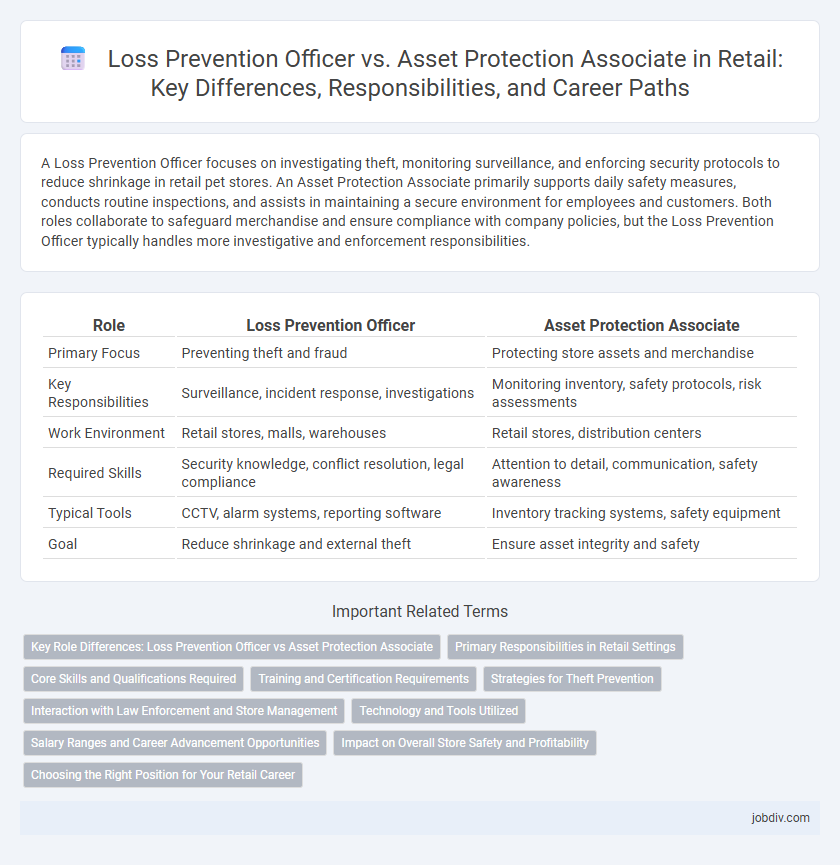A Loss Prevention Officer focuses on investigating theft, monitoring surveillance, and enforcing security protocols to reduce shrinkage in retail pet stores. An Asset Protection Associate primarily supports daily safety measures, conducts routine inspections, and assists in maintaining a secure environment for employees and customers. Both roles collaborate to safeguard merchandise and ensure compliance with company policies, but the Loss Prevention Officer typically handles more investigative and enforcement responsibilities.
Table of Comparison
| Role | Loss Prevention Officer | Asset Protection Associate |
|---|---|---|
| Primary Focus | Preventing theft and fraud | Protecting store assets and merchandise |
| Key Responsibilities | Surveillance, incident response, investigations | Monitoring inventory, safety protocols, risk assessments |
| Work Environment | Retail stores, malls, warehouses | Retail stores, distribution centers |
| Required Skills | Security knowledge, conflict resolution, legal compliance | Attention to detail, communication, safety awareness |
| Typical Tools | CCTV, alarm systems, reporting software | Inventory tracking systems, safety equipment |
| Goal | Reduce shrinkage and external theft | Ensure asset integrity and safety |
Key Role Differences: Loss Prevention Officer vs Asset Protection Associate
Loss Prevention Officers primarily focus on investigating theft, monitoring surveillance systems, and enforcing security protocols to reduce shrinkage. Asset Protection Associates emphasize physical store safety by conducting routine inspections, managing alarm systems, and assisting employees in identifying risky behaviors. The former role centers on incident response and enforcement, while the latter prioritizes prevention and safety maintenance within retail environments.
Primary Responsibilities in Retail Settings
Loss Prevention Officers focus on identifying and deterring theft, conducting surveillance, and investigating incidents to minimize inventory shrinkage in retail environments. Asset Protection Associates primarily monitor store premises, implement safety protocols, and collaborate with staff to reduce risks related to both theft and operational hazards. Both roles are essential in safeguarding merchandise, ensuring regulatory compliance, and maintaining a secure shopping environment.
Core Skills and Qualifications Required
Loss Prevention Officers require strong investigative skills, attention to detail, and knowledge of security protocols to effectively deter and manage theft incidents. Asset Protection Associates focus on surveillance techniques, customer service, and risk assessment to maintain store safety and minimize shrinkage. Both roles demand excellent communication, problem-solving abilities, and familiarity with loss prevention technology and reporting systems.
Training and Certification Requirements
Loss Prevention Officers in retail typically require specialized training in security protocols, surveillance techniques, and emergency response, often supported by certifications such as Certified Protection Professional (CPP) or Loss Prevention Qualified (LPQ). Asset Protection Associates receive foundational training centered on inventory control, shoplifting deterrence, and customer safety, with certifications like Retail Loss Prevention Certification (RLPC) enhancing their qualifications. Both roles prioritize ongoing education, but Loss Prevention Officers undergo more rigorous and advanced certification processes to handle complex security challenges.
Strategies for Theft Prevention
Loss Prevention Officers implement advanced surveillance systems and conduct thorough investigations to identify theft patterns and apprehend suspects, ensuring store safety and minimizing shrinkage. Asset Protection Associates focus on proactive measures such as training employees in theft deterrence, maintaining visible presence on the sales floor, and performing routine audits to secure merchandise. Both roles collaborate by leveraging technology, employee engagement, and compliance protocols to create a comprehensive theft prevention strategy in retail environments.
Interaction with Law Enforcement and Store Management
Loss Prevention Officers coordinate directly with local law enforcement to investigate theft incidents and ensure legal protocols are followed, while Asset Protection Associates primarily focus on internal communication and incident reporting within store management. Loss Prevention Officers often act as the liaison during police interviews and evidence collection, whereas Asset Protection Associates support by monitoring security systems and maintaining detailed records for management review. Both roles require collaboration with store managers to develop preventive strategies, but Loss Prevention Officers have a more active role in law enforcement engagement and external investigations.
Technology and Tools Utilized
Loss Prevention Officers leverage advanced surveillance systems, electronic article surveillance (EAS) tags, and data analytics software to identify and mitigate theft risks effectively. Asset Protection Associates utilize integrated point-of-sale (POS) monitoring, RFID tracking technology, and mobile reporting apps to maintain real-time asset visibility and streamline incident response. Both roles depend on technology such as CCTV, access control systems, and inventory management tools to enhance retail security and reduce inventory shrinkage.
Salary Ranges and Career Advancement Opportunities
Loss Prevention Officers typically earn between $30,000 and $50,000 annually, with salaries rising in high-risk or large retail environments, while Asset Protection Associates generally start in the $28,000 to $42,000 range, reflecting entry-level responsibilities. Career advancement for Loss Prevention Officers often leads to supervisory roles or corporate security management, leveraging experience in risk assessment and investigation. Asset Protection Associates can progress to Loss Prevention Officer positions or specialize in areas like inventory control and safety compliance, enhancing their marketability and earning potential.
Impact on Overall Store Safety and Profitability
Loss Prevention Officers play a critical role in reducing theft and fraud, directly increasing store profitability through targeted surveillance and incident response. Asset Protection Associates enhance overall store safety by implementing safety protocols and educating staff, which minimizes accidents and liability claims. Both positions contribute substantially to a secure retail environment, ultimately safeguarding revenue and promoting a positive shopping experience.
Choosing the Right Position for Your Retail Career
Choosing between a Loss Prevention Officer and an Asset Protection Associate depends on your career goals and responsibilities preference within retail security. Loss Prevention Officers typically focus on investigating theft incidents, conducting surveillance, and collaborating with law enforcement, requiring strong analytical and enforcement skills. Asset Protection Associates primarily monitor store environments, enforce safety protocols, and assist in reducing shrinkage through regular inspections and customer interaction, ideal for those seeking a proactive, customer-facing role.
Loss Prevention Officer vs Asset Protection Associate Infographic

 jobdiv.com
jobdiv.com